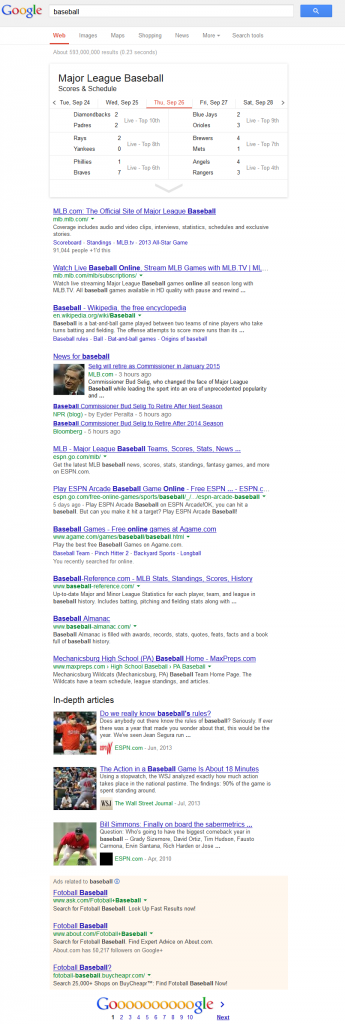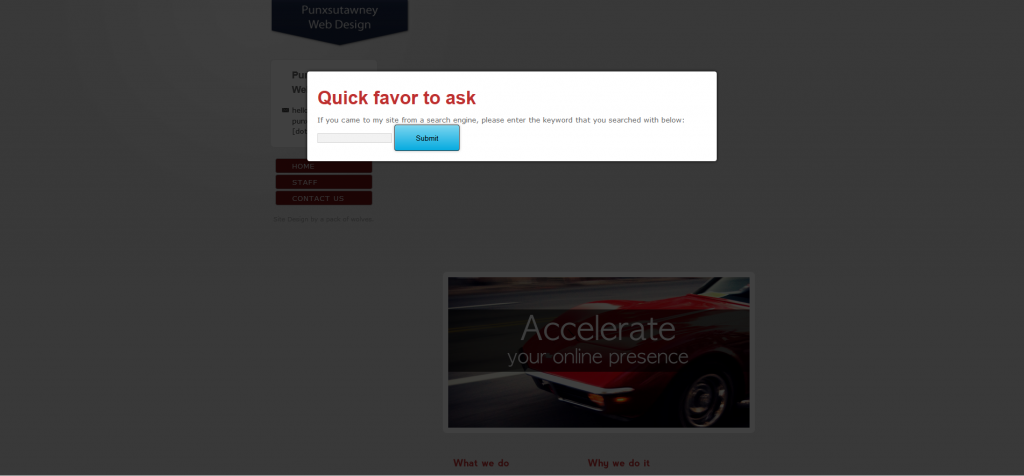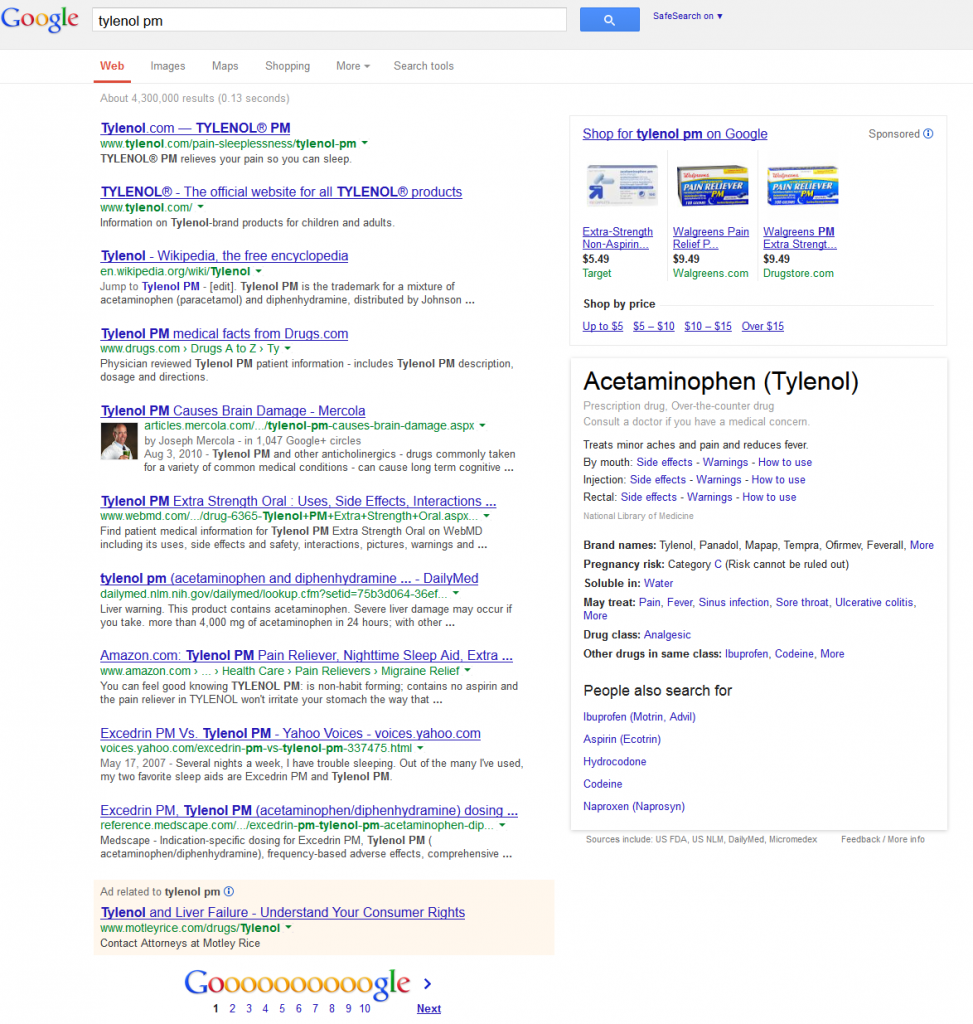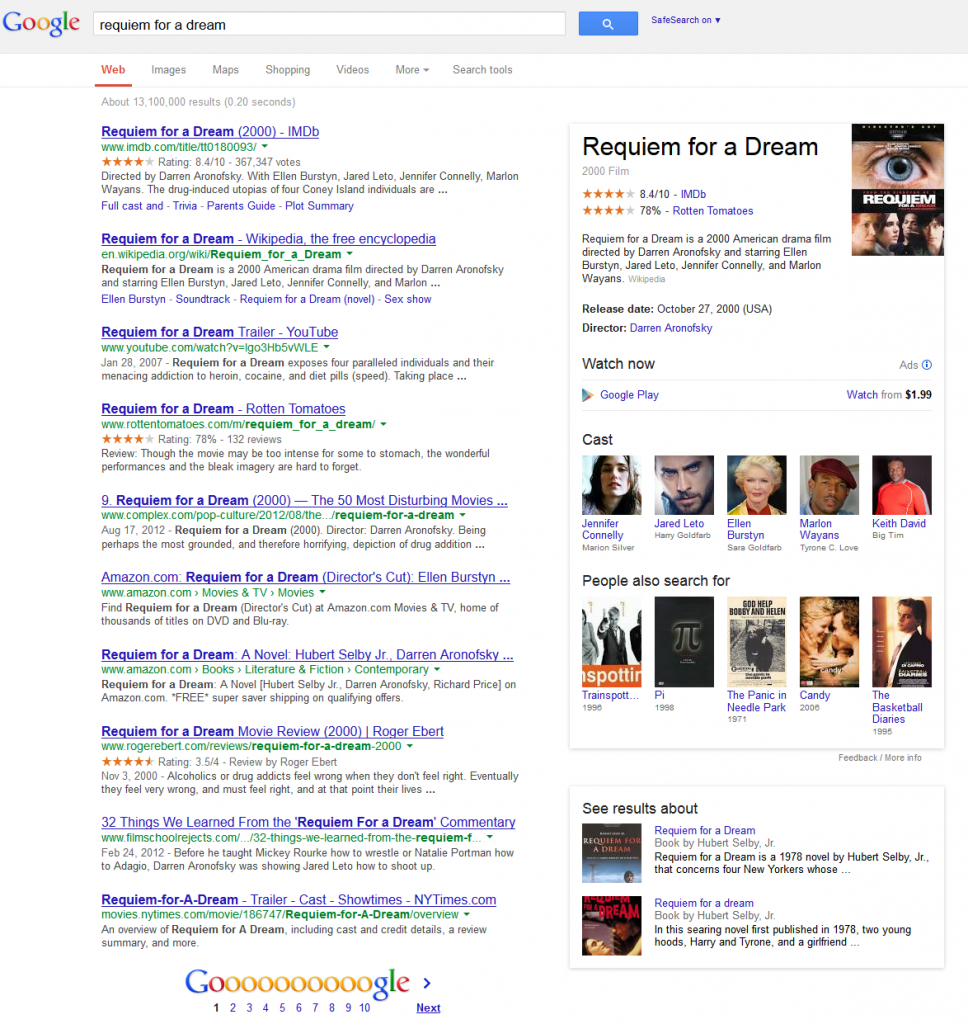There’s been tons of posts about what was said by Matt Cutts at this year’s PubCon but here is the video evidence via Ali Husayni.
Post Category → Inbound
Google Inefficiencies You Should Be Exploiting Right Now
If you want to drive consistent traffic to your site through search engines, it helps to understand weaknesses in Google’s algorithm that are easier to attack. Much like the Moneyball Oakland A’s of the early 2000s, we have to look at what ranking signals Google is placing a lot of weight on and see which ones are easy to exploit that can result in significant rankings boosts. The Oakland A’s found market inefficiencies…we’re looking for algorithm inefficiencies. Continue reading
Tool: Annoying popup to gather keyword data from users
An annoying popup to gather keyword data from Google. Based off of this: http://hallofhavoc.com/2013/05/how-to-create-an-overlay-popup-box-using-html-css-and-jquery/ and inspired by this tweet.
Get ready to get your keyword data back like it’s 2008.
Here are the basic instructions to get it up and running
1. Head to Github and download the source code that you’ll need. These instructions are also in the readme.txt file.
2. Add the JS and CSS files to your root folder.
3. Add the following lines into the head on all pages you want to load the annoying popup.
4. Add the HTML for the annoying popup onto all pages that you want it to display on. Anywhere in the body will do.
5a. Hook up the annoying pop up to email you every time somebody fills it out.
5b. Profit?
Google goes scraper with Hummingbird update
Google announced today their latest update to their search engine — Hummingbird. Google’s PR team calls the move “significant” and says it will impact 90% of search queries, which if true is an insane amount and a massive change.
Google on what will be changing with Hummingbird:
[Hummingbird will] give better answers to the increasingly complex questions posed by Web surfers.
After a look at the search results over the last month, it’s clear what Google is really saying is “We will now scrape more data from 3rd party websites so people never have to leave Google.com.” Once Google starts fully answering search queries, there is no reason for people to leave Google. With Google crawling and caching nearly every page on the web, they can display snippets and data from web pages that can directly answer informational search queries.
This is going to be frustrating for website owners and content producers who are spending countless hours to create content and information that people want to read online…only to have Google crawl their page, grab relevant information and display it on Google.com instead of sending the visitors to your site. What Hummingbird is really about is keeping people on Google properties longer.
I spent a few hours trying hundreds of different queries to demonstrate what I’m talking about. Here are a few that stuck out where Google is scraping others content and serving it up on their own pages.
Query: Tylenol PM
Observations: Google is adding in a bunch of scraped content from authoratative medicine and health sites along the right side. They also have prominent ad listings and a number of links to other Google searches. As with a lot of the Hummingbird SERPs, Google is utilizing the right side of the page to display scraped content and advertisements.
Query: How To Lose Weight
Observations: This is a massively popular search query that Google has drastically changed in the SERPs. Instead of displaying extra info on the right side, Google decided to use the most valuable real estate on the entire page to scrap information from authoritative sites (seeing a pattern yet?). This is really going to impact non-government and educational health sites who used to rank in position 3-10 because they are pushed way down in the SERPs post-Hummingbird.
Query: Flight to San Francisco
Observations: Ads ads ads. Google has a huge affiliate Google Flight box right at the top of the SERPs. This has been seen on flight related queries for a while but has become even more prominent in Hummingbird. A common theme: Google wants more money from transactional queries.
Query: Requiem For A Dream
Observations: Search most media titles (books, movies, etc) and you’ll see the right side of the screen loaded with tons of scraped content — reviews, summaries, actors and more. There’s also other images and graphics that go back to other Google properties. All of the cast and related media links are to other Google search queries. Google also added a call-to-action to “Watch Now” on Google Play. I’m sure users will really appreciate that addition.
Query: Baseball
Observations: MLB standing show up right at the top and take up the entire screen on smaller laptops and devices. There’s no reason to leave Google if you are looking to keep up to date with the scores. Not sure how MLB.com will feel about Google using their data and taking away traffic, but it’s for users!

I leave you with some words from Google themselves on affiliate sites with thin, scraped content:
Some webmasters use content taken (“scraped”) from other, more reputable sites on the assumption that increasing the volume of pages on their site is a good long-term strategy regardless of the relevance or uniqueness of that content. Purely scraped content, even from high-quality sources, may not provide any added value to your users without additional useful services or content provided by your site; it may also constitute copyright infringement in some cases. It’s worthwhile to take the time to create original content that sets your site apart. This will keep your visitors coming back and will provide more useful results for users searching on Google.
LOL.
Update 9/30/2013
Wanted to answer add my thoughts to a couple of questions that people keep sending me. Feel free to shoot me an email if you have any questions.
1. Hasn’t Google been showing these types of search results for a while?
Yes, in some cases. The Knowledge Graph has been around for a while and Google has started using it in more and more queries. Hummingbird is aimed to better understand what Google calls “conversation” queries and to better answer more complex queries. From what I’ve seen, in practical terms this means that Google is rolling out Knowledge Graph results to more and more queries.
Another example of this is the query “earth vs mars” that has been being shared today. Google is directly answering a query in a different way than they used to through the Knowledge Graph. They’ve definitely become more prominent in recent months and Hummingbird is said to have rolled out over the course of the past few months.
Feel free to disagree, but Knowledge Graph results seem to be a lot more prominent now than they ever have and Google is specifically referencing the Knowledge Graph and semantic search as the two biggest areas of change.
2. The SERPs that you are showing look a lot different than mine.
Google SERPs seem to change all of the time depending on location, browser history, data center and other factors. I’ve been seeing similar results on a number of queries from different locations.
Googles moves all search over to HTTPS, kills organic keyword data
Edward Snowden’s NSA leaks have led to Google nuking all keyword data provided by organic searches. The only way you can see what keywords are driving people to your website from Google searches is by buying Google PPC ads or through notoriously inaccurate data in Google Webmaster Tools.
Drunk on content
When we spend so much time reading what other people create online, it makes us less likely to create ourselves. If you make the mistake of convincing yourself you need to read every single article about a particular subject, you are going to drown in waves of recycled content and probably not learn anything. Unless you really think that twerking can teach you something about inbound marketing.
The people who are writing content worth your time aren’t sitting around reading crappy content or trying to figure out what to blog about next. They are makers and doers who happen to write about things. They write because they have something new and interesting to say.
Around 2 months ago I moved into a new apartment. I put off getting Internet for one week than two and eventually I decided I didn’t really need it for the time being. (Disclaimer: Have 4G LTE mobile hotspot available on my phone for ’emergencies.’)
What I found was that I was coming up with better ideas for new marketing initiatives and writing better, more original content than I ever have. I wasn’t wasting time reading articles and convincing myself that too many people and already wrote about a subject or that a particular market was too small to be interesting.
By only consuming content that is truly worth your time you’ll find yourself inspired and engaged instead of getting drunk on content that says a lot without really saying anything at all.
Quick and Easy Growth Hacks
New post I wrote for Medium. Laying out some ideas and tactics I use to acquire customers online.
Rand Fishkin’s shoes and the SEO echo chamber
One of the biggest problems with the SEO industry is that we spend too much time talking amongst ourselves and not enough educating others about what we do. Continue reading
How unmoderated blog comments can lead to a Google penalty
Lesson on comment spam: if you don’t monitor it, they’ll also spam a ton of links to the page they got the link on. Happened to my blog.
— Jon Cooper (@PointBlankSEO) July 20, 2013
If you are using WordPress or any of the other big blogging platforms out there, you usually don’t have to worry a whole ton about SEO. These CMS are fairly SEO friendly out of the box and it’s easy to add a plugin or read one of the thousands of SEO guides online for them if you want to get a little bit more advanced.
One area that can really destroy your SEO — and one that most people don’t think of — is your comments section. Comments sections that go unmoderated can become attractive to spammers, making your site a target.
A new tactic that I’ve seen link spammers doing the past year is submitting a few blog comments to a site and then blasting the site with crappy, anchor text heavy links to drive up the value of the comment link on your site. Jon Cooper mentioned this had happened to his blog. I”ve seen it happen to a handful of sites as well.
I’ve even seen this happen a few times on sites that weren’t publishing the comments…just letting them hang around unmoderated. Moderating comments can be a big pain for businesses, especially ones that like to publish posts to their blog periodically and forget about it otherwise. From what I’ve seen, it’s not uncommon to see corporate blogs with 1000s of comments awaiting moderation.
In a few cases, I’ve seen the dreaded “unnatural links warning” pop up in Google Webmaster Tools because of spammers blasting blog posts with forum posts and other comments. Those links are next to impossible to remoave and it’s going to be a tough penalty to get lifted. Google doesn’t do a very good job yet at deciphering the intent behind links built to a website. Hopefully in the future they’ll see that no website owner in their right mind would build 1,500 links with anchor text “dental implants” to their used car dealership site.
Bulletproofing your site
There are a few ways to cut this problem off at the knees. WordPress doesn’t come with Askimet installed anymore and far too many people forget to add this into the site (The activation process does suck though). Akismet isn’t perfect but does a pretty remarkable job of filtering through pending comments for spam. It’ll save you a lot of time.
Another preventive measure to take is adding some hidden fields or enhanced anti-spam measures to the comments section itself. If nobody ever comments on your blog, you could just get rid of the comments section too. That’s an option that most businesses never think about, but a viable one.
Future brand signals for Google
Brand signals are becoming more important for Google with every update. Metrics like domain authority, domain age, social shares and author/publisher rank having more impact in the SERPs we can anticipate brands continuing to dominate. While Google has many different metrics to distinguish brands, as time moves forward so to will their methods of differentiation.
Here are a few ideas for what future brand signals may look like as adoption of hardware like Glass and Google operated phones become more prominent.
- Number of times Android phones visit retail locations
- How frequently brands are mentioned in conversations with Glass
- How often influencers mention brands in videos (h/t to my coworker Xander)
- Volume of brand mentions in Android texts and Gmail messages
As Google products hold a bigger place in the physical world (phones, wearable tech, cars, etc), the way their search engine collects and evaluates brand signals will drastically change. Instead of personalizing search on location and browser history, semantic search will be powered by where we go, what we look at and what we say.




